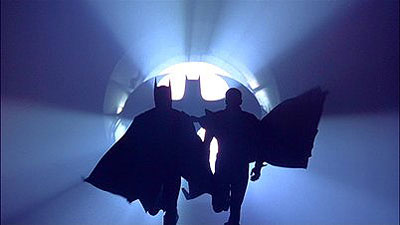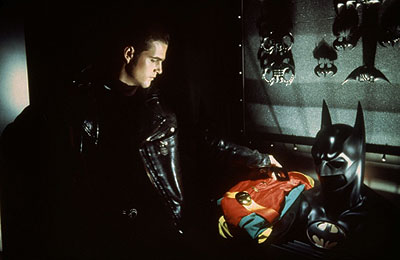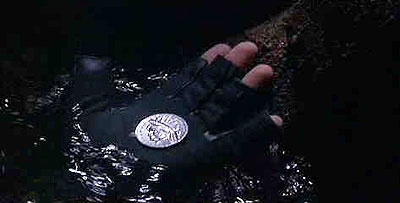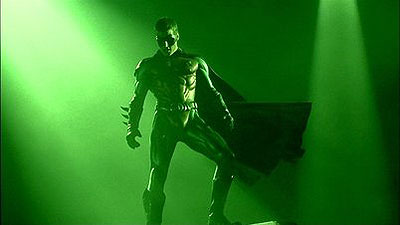In Praise Of Joel Schumacher And BATMAN FOREVER, Part One
Published on June 10th, 2011 in: Comics, Movies, Over the Gadfly's Nest |By Paul Casey
Since Christopher Nolan’s third Batman film, The Dark Knight Rises, has begun shooting, we thought it appropriate to revisit the frequently maligned Joel Schumacher film Batman Forever, which was released on June 16, 1995.—Ed.

First, a bit of background.
To many fans, Christopher Nolan’s work with the Batman franchise has served as a legitimization of the artistic worth of comic books. As both a comic book movie and also as a signifier of the depth of the character and the source material (from which the film’s subtleties originated), The Dark Knight laid down the gauntlet, setting the critical and financial standards by which every comic book movie will be judged in the future.
Just as Frank Miller’s The Dark Knight Returns and Year One allowed many closeted comic book fans to step out into the light and discuss comics at the dinner table, The Dark Knight was, to some, the cinematic equivalent. Those undoubtedly seminal graphic novels also had another effect: They made those who had dismissed comic books as worthless kid’s stuff think twice.
Alan Moore—the writer of Watchmen, The Killing Joke, and other comics—often shows his curmudgeonly demeanor in interviews. Even while possessing a self-loathing attitude towards the medium in which he has worked nearly his entire life, he made several salient points, when he was interviewed by Wired in 2009:
If you remember back in the ’80s, there was an incredible spate of monumentally lazy headlines in British and American magazine and newspapers. But also something along the lines of “Bam! Sock! Pow! Comic Books Aren’t Just for Kids Anymore.” I used to think those headlines were just irritating, but it’s only recently that I’ve looked back and realized how incredibly inaccurate they were. Comics had not grown up, bam-sock-pow. What had happened was that you’d gotten two or three comics that had gotten, perhaps for the first time, serious adult elements in their compositions. This was judged as miraculous as a dog riding a bicycle back in the 1980s. It doesn’t matter whether he’s riding it particularly well; it matters that he’s riding it at all.
I think that a lot of people, irrespective of whether they’d ever read a book like Watchmen, took it basically as a form of license. I think there were a surprising number of people out there who secretly longed to keep up with the adventures of Green Lantern but who felt they would have been socially ostracized if they had been seen reading a comic book in a public place. With the advent of books like Watchmen, I think these people were given license by the term graphic novel. Everybody knew that comics were for children and for intellectually subnormal people, whereas graphic novel sounds like a much more sophisticated proposition.
Unfortunately this newfound “respect” for the art form is apparently not retroactive. Many professed comic book enthusiasts have a hard time defending anything which is not steeped in blood, sex, or otherwise showing its “maturity” credentials through excess. One would think that being legitimized by those who think 90-95% of all comic books are disposable trash for simpletons and unworthy of the “Art” tag, is not what is best for the art form in question. For these people, The Dark Knight Returns or Year One are good because they are exceptions in their medium, not a product of it.
This brings us to Joel Schumacher and his two Batman films: the very successful Batman Forever and briefly, the much maligned Batman & Robin.

The current form of accepted Batman film history is that Joel Schumacher—the horrendous “commercial hack” who directed such films as Falling Down and Flawless—is responsible for unspeakable crimes against the character. Batman Forever is now considered to be one and the same as its sequel Batman & Robin. From an artistic standpoint and in light of contemporary critical and public reaction, this is a hefty case of revisionism. Despite what most on the interwebs would lead you to believe, Batman Forever was well received when it was released in 1995.
Joel Schumacher called the film a “Pop Culture Opera.” While not being the ultimate definition of comic books and Batman, it has been a notable part of their history. It should be embraced, not swept under the shame rug. Pop Culture doesn’t necessarily speak of stupidity or shallowness. The Simpsons is Pop Culture. Seinfeld is Pop Culture. The Beatles are Pop Culture. One of the reasons Batman became such a Pop Culture icon is because he is not a shallow creation. There is a seriousness—as much as there is a playfulness—within the character and his world.
There is something there, in its purest and simplest form, which appeals to a lot of people. Once you are willing to be a part of that world, then the “ridiculousness” of it all becomes one of its greatest strengths and allows you to tell compelling stories which do not need to care about how they appear to the norms. Schumacher knew this. The Batman story, like the overwhelming majority of comic books, is basically a story of Good Guys versus Bad Guys.You are dealing with archetypes and their existence as a symbol to those who have emotionally invested in these characters.
Stripping it down to its foundations and making it explicit that “Batman = Good Guy” and “Two-Face = Bad Guy” (regardless of the relevant criticisms of this particular portrayal) is what comic books do all the time. Sometimes the subtleties of the character are irrelevant; sometimes the archetypes which they represent are of the highest importance. Dealing with the broad elements of the characters is as relevant (and sometimes more so) than dealing with the details, because these are ultimately broad characters. The details, more often than not, serve the archetype over anything else.

Seeing the worth in those elements of Batman—which stretch all the way back to 1939—and wishing to treat them with the same respect that you would any more “serious” fare, is the litmus test by which one should judge the honesty of an adaptation. Reading Denny O’ Neil’s essential R’as-Al-Ghul stories, as collected in Tales of the Demon, will present you with a world peppered with the humorous, silly elements of Batman. These seminal stories are nonetheless taken seriously by the writer and the characters are allowed many layers and subtleties. The only barrier to appreciating these earlier stories is the reader themselves.
Schumacher was willing to take on those elements of comic books and Batman which were always Pop Culture in their nature and appeal and put them before as wide an audience as possible, without any compromises to the “But that’s not reaaaaalistic!” crowd.
In a 1995 interview with Charlie Rose, Joel Schumacher responded to critic David Denby’s harsh review of Batman Forever:
Well, it’s sad when life has changed so much and some people live in a time and a place and in an anachronism within themselves. It’s hard for a deracinated East Coast critic to really understand what entertainment is for the rest of the planet. I don’t know what David is comparing it to, Potemkin?
I mean this is a Batman comic book. I think there is a very strong story in this. It introduces the Robin character, there’s a love story with Val. They have two great villains in this movie and a lot of fun. I’m sorry that he can’t see . . . I’m sorry that all of the hard work and energy—the beautiful sets, the costumes, the jokes, the choreography—disturbs him so much. I’m sorry that he finds our film “disgraceful” but I can’t agree with him.
Here Schumacher is defending the form, not denigrating it. He is willing to stand up and publicly admit that he finds artistic worth in the least acceptable elements of comic books, which is more than I find from many comic book fans. In other words, it was not Joel Schumacher who was disrespectful towards Batman and his fans, it was Batman fans who were disrespectful towards him.
There is a touch of self-loathing about the comic book fan who turns his or her back and refuses to acknowledge a film like Batman Forever as being a legitimate expression of the character. Apologists are crimson-cheeked, pushed out into the light, and unable to put forward a reasonable counter-argument to the David Denbys of this world, when the weight of so many comic books come crashing down, accurately propelled by Schumacher’s interpretation. They should just stay in the closet, if they’re so ashamed.
Denby, so forcibly opposed to what Batman Forever “stood for,” was also insulting and simplistic in his review of The Dark Knight, in case you’re tempted to chuckle into your self-satisfied trousers. He again cited the commercial jibes: “Unfortunately, I can’t tell you a thing about it, because the combat is photographed close up, in semidarkness, and cut at the speed of a fifteen-second commercial.”
He also seems to miss the concept of “reboot” entirely: “In brief, Warner Bros. has continued to drain the poetry, fantasy, and comedy out of Tim Burton’s original conception for ‘Batman,’ completing the job of coarsening the material into hyperviolent summer action spectacle.”
It is perhaps ill conceived then, to side with this character, if you have any respect for the medium which has taken so much of your money and time. Is this really the audience you want to convince of the worth of comic books, or their movies?

Here are some quotes from another negative review of Batman Forever, this time from Barbara Shulgasser of the San Francisco Chronicle in 1995:
. . . Batman is the nominal hero. The trouble is, he isn’t really interesting. He doesn’t have superpowers. Apart from some terrific toys and a cool car, what distinguishes Batman from the daredevil police detective played by Bruce Willis in the “Die Hard” franchise, or Clint Eastwood’s Dirty Harry or any of the other bad guy-fighting movie heroes is that eerie black rubber suit, and the man’s unnerving identification with a small nocturnal animal. The suit seems to get more muscular with each movie. This time Batman sports two little black rubber nipples. I was afraid to look at the crotch.
But Schumacher hasn’t lightened it enough. From the opening moments, the movie is unreasonably noisy.
Still, there is something audaciously silly about this hero; if he’s willing to be seen dressed like that then he probably isn’t afraid of anything. His craziness ends up being kind of reassuring.
So one of Shulgasser’s main criticisms about the film hinges on Batman being a mortal man without superpowers and otherwise representing the founding principles of the character and his world. Combine that with her apparent case of tinnitus and assertion that the film is not “light” enough, and you have a position which no self-respecting comic book reader could endorse.
Even if there was an overwhelmingly negative response to Batman Forever (there wasn’t), it came from people who, at the core of their arguments, focus on the fundamental absurdity of taking something like Batman seriously. They were not working from the perspective of “this character has so much potential and Joel messed it up.” It is advisable then, to pause before you profess agreement with the people who so demean the medium you profess to love.
Check out the Blog on Monday for part two of this article, where Paul will discuss more about Joel Schumacher’s interpretation, plus comments from Val Kilmer, Batman creator Bob Kane, and the positive critical response to Batman Forever.—Ed.
One Response to “In Praise Of Joel Schumacher And BATMAN FOREVER, Part One”
June 13th, 2011 at 10:02 am
[…] Since Christopher Nolan’s third Batman film, The Dark Knight Rises, has begun shooting, we thought it appropriate to revisit the frequently maligned Joel Schumacher film Batman Forever, which was released on June 16, 1995. Click here to read Part One.—Ed. […]
Time limit is exhausted. Please reload the CAPTCHA.